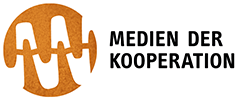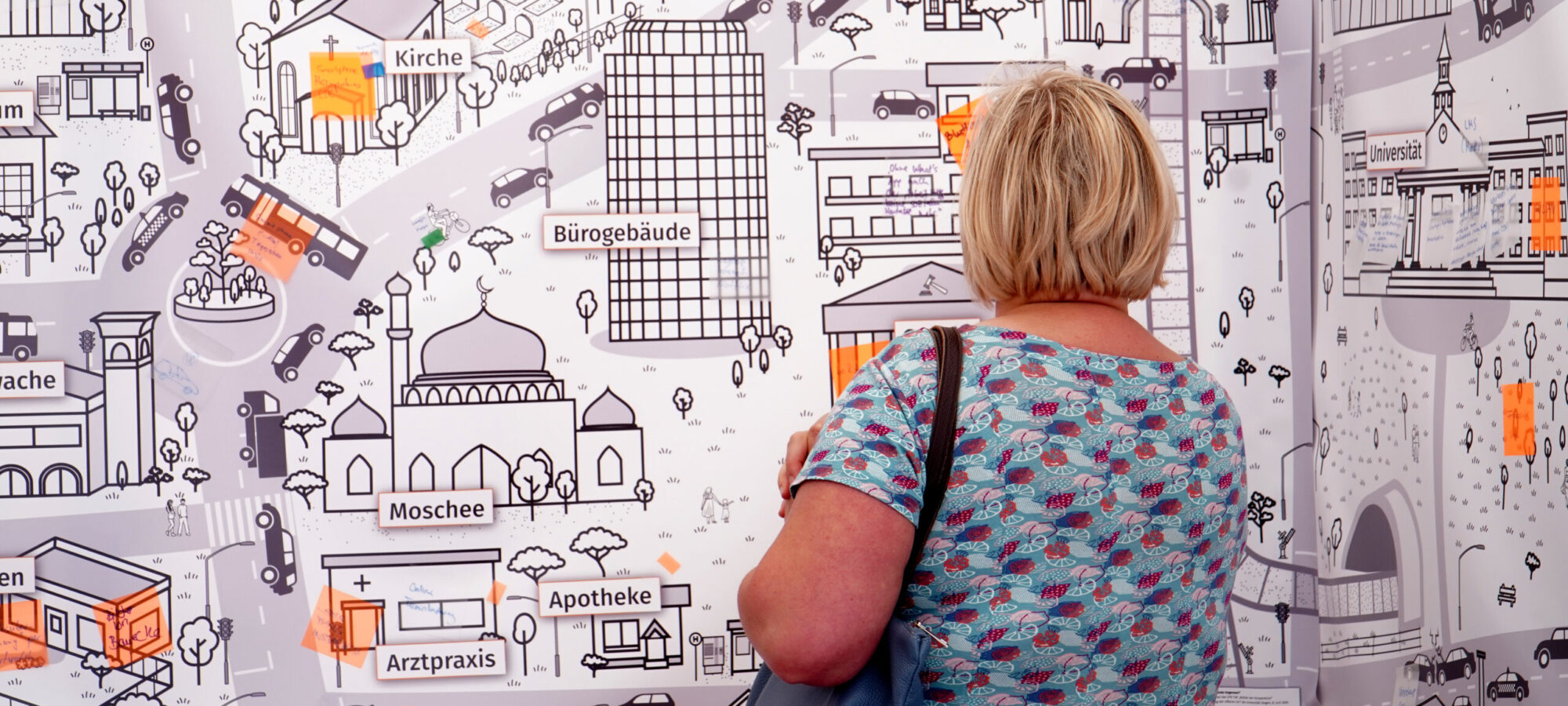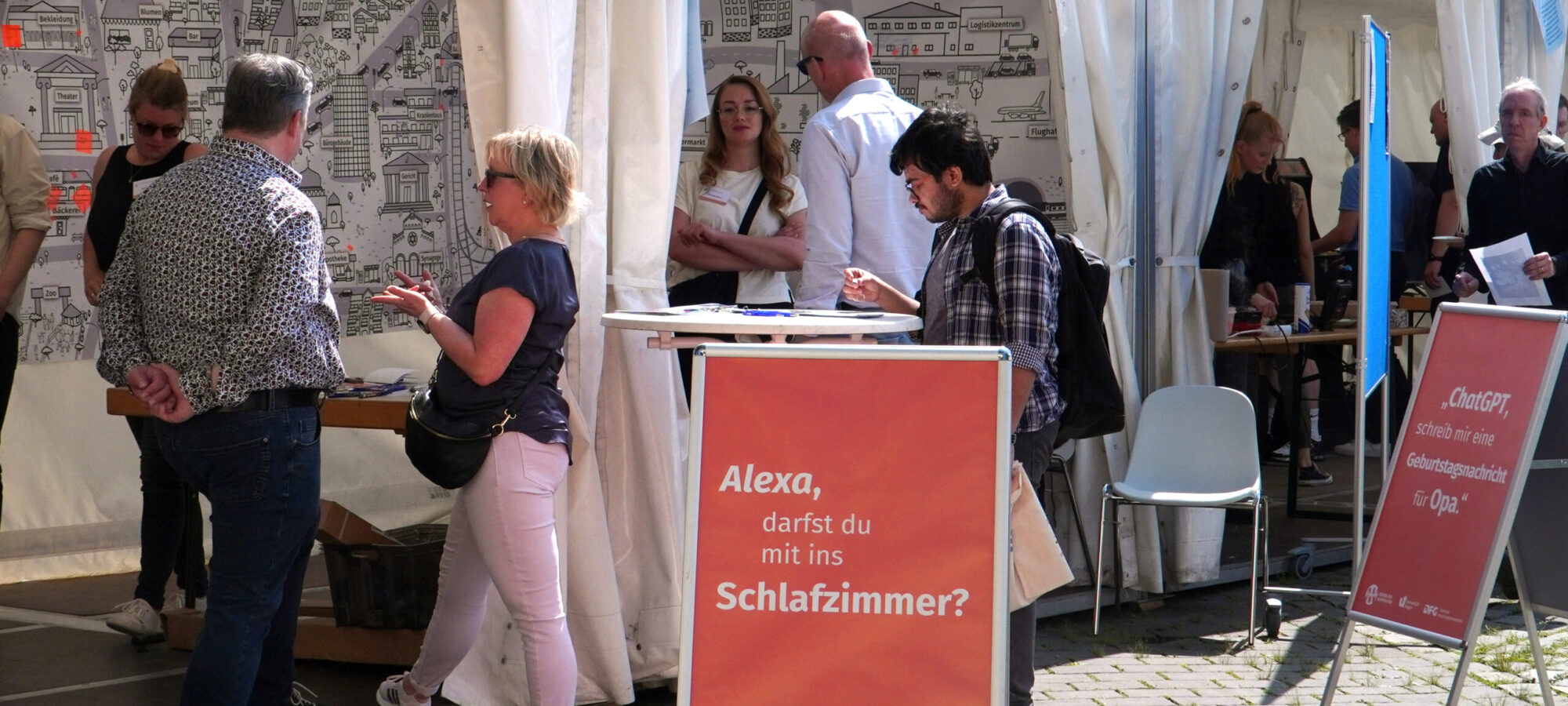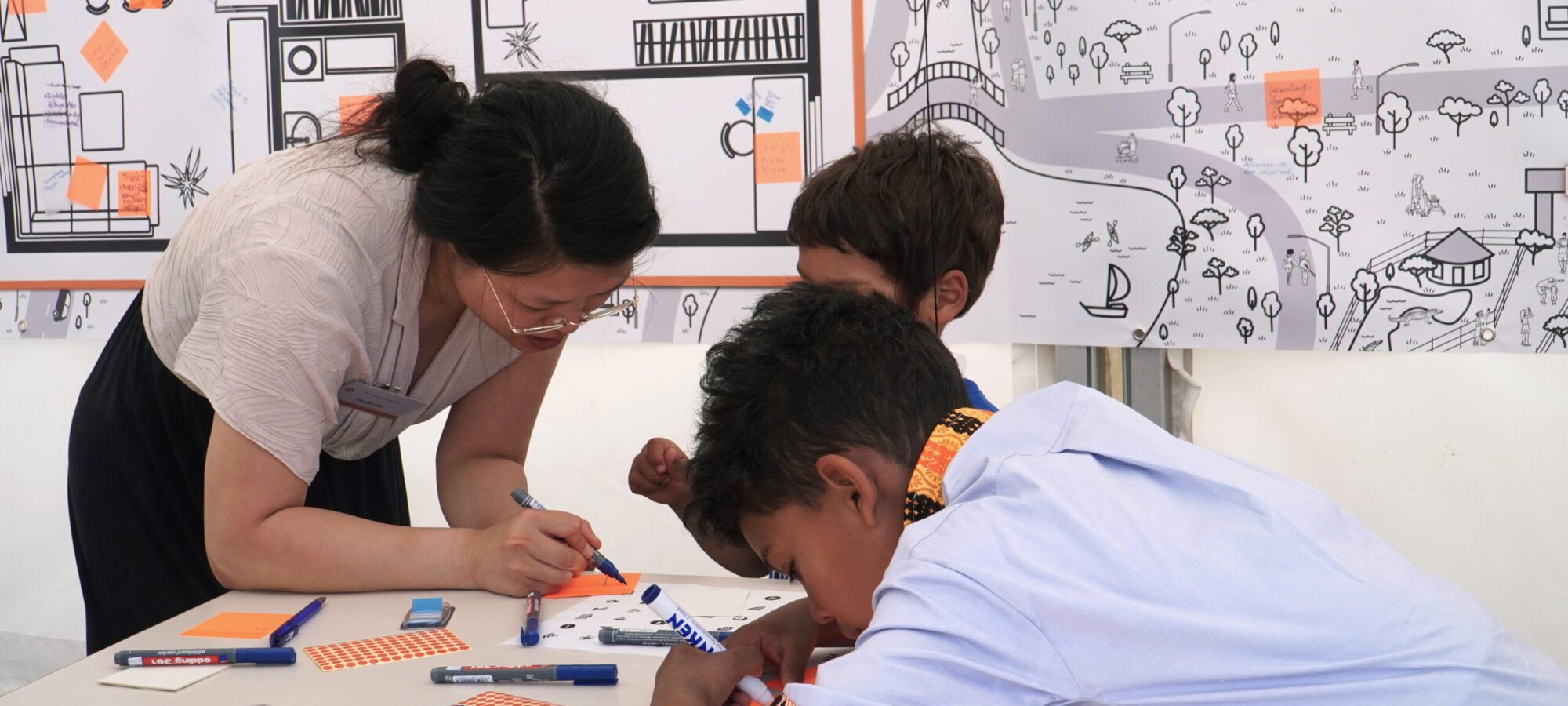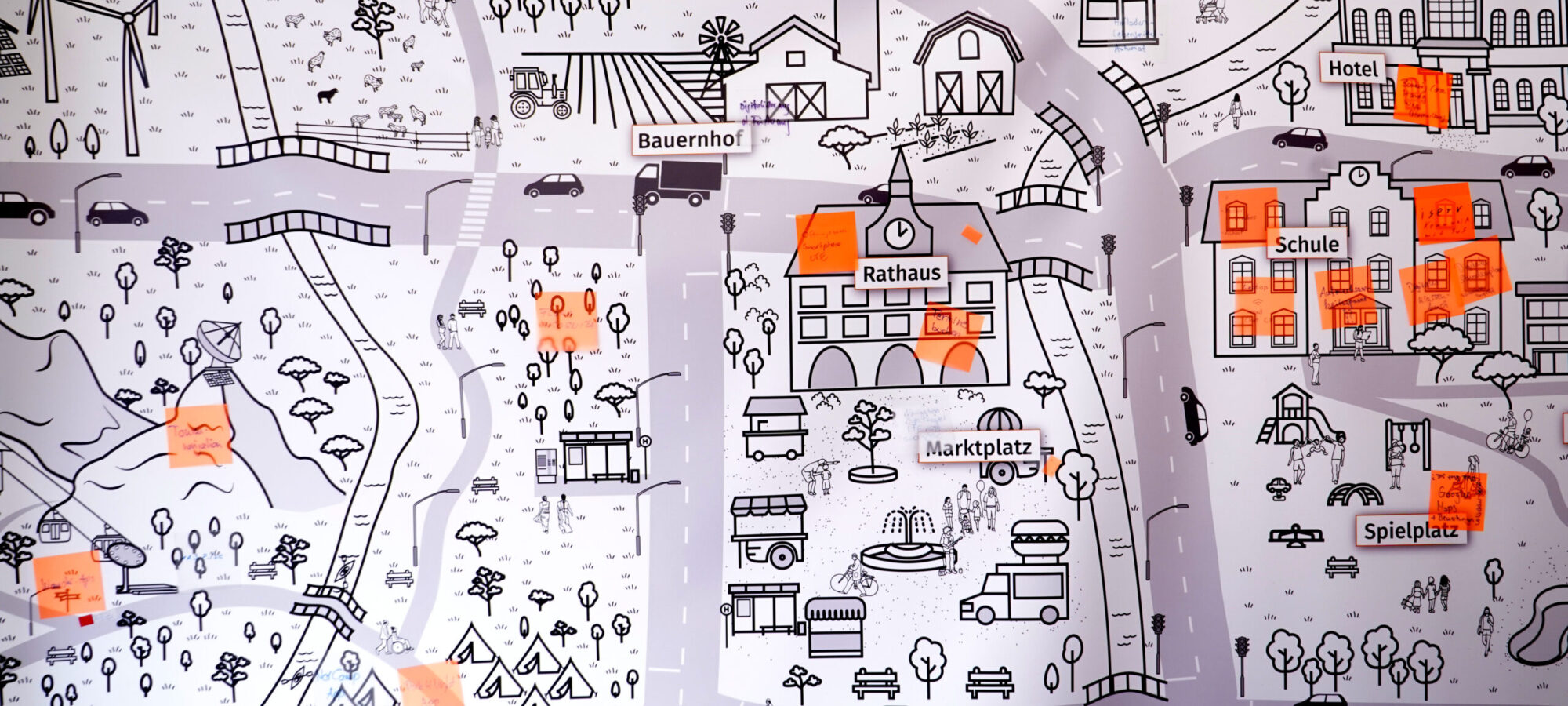Neuigkeiten
„En/Countering Tracking: Resisting spatiotemporal media operations in computational culture“
The deadline for submissions is September 15, 2024.
Countering tracking has become a key form of resisting the logics of computational culture. Subversive encounters have emerged in recent years as counterpoints to the hegemonic logics of web infrastructures (Christl and Spiekermann 2016), platform labor (Heiland 2021) and racial capitalism (Russell and De Souza 2023). These attempts to counter tracking take forms that range from investigative visualizations (Fuller and Weizman 2021) or provoking glitches in tracking infrastructures (Leszczynski and Elwood 2022) to uncovering web-based tracking (Sharelab 2015), building counter-infrastructures for labor resistance (Qadri and D’Ignazio 2022), or using sensors and satellite images for critical investigations (Ballinger 2023; Boyd et al. 2018).
Countering tracking becomes a resistant media operation itself, disentangling hegemonic spatiotemporal regimes and their socio-political forces. These forms of countering tracking challenge existing theoretical approaches to the critical analysis of tracking and open up new perspectives on subversion and resistance in computational culture. How is countering tracking by means of tracking possible in different contexts and in relation to software, infrastructures and aesthetics?
We invite critical encounters through and of tracking, enabling new perspectives on computational infrastructures, software, (non-)human aesthetics and operative interactions, by means of theoretical reflections, critical making or activism. We aim at gathering submissions that 1) render existing tracking operations perceivable; 2) disrupt tracking infrastructures; or 3) operationalize tracking itself for resistance. The special issue invites theoretical, conceptual and performative approaches from fields such as media studies, visual studies, artistic research, sociology and critical geography to address the question of how tracking becomes a repressive, subversive or activistic media operation.
Topics and projects might include:
- Inventive methods that repurpose tracking infrastructures, sensors, software and data to research computational culture
- Detailed empirical and critical studies exploring the relations of en/countering tracking in computational culture
- En/countering tracking in labor resistance and platform capitalisms
- Critical theoretical conceptualization of tracking or countering for the study of computational culture
- Critical explorations of the chronopolitics, timescapes and spatiotemporal regimes of tracking
- Activist media, countersurveillance, tactical media, decolonial, (glitch) feminist and resistant epistemologies of tracking
- En/countering relations between political economy, racialized capitalism and tracking
- Visual cultures, (in-)visualities and aesthetics of en/countering tracking
- En/countering tracking in media art and artistic activism
Schedule:
750-word abstracts should be emailed to en_countering_tracking@uni-bonn.de by September 15, 2024. Abstracts will be reviewed by the special issue editors and the Computational Culture editorial board.
Any queries can be addressed to the special issue editors at: en_countering_tracking@uni-bonn.de
Official call for contributions | Call for contributions PDF
“The Datafied Web”:
6th RESAW Conference (5-6 June 2025, Siegen University)
The deadline for submissions is 15 October 2024.
Do you remember the beginnings of early metrics in the 90s, the birth of web counters, those digital pioneers that marked and started to quantify the pulse of online activity, the novelty of seeing website visits measured in real-time, eye-catching graphics becoming the currency of online attention, and the early days of companies like Webtrends, Urchin and DoubleClick?
We invite scholars, researchers, web archivists to contribute to the 6th RESAW conference on the topic of “The Datafied Web”, through a historical lens. We would like to delve into the historical roots, trends, and trajectories that shaped the data-driven paradigm in web development and to examine the genealogies of the datafied and metrified web. Historical studies of trajectories towards a databased web and the emergence of platform-driven mobile ecosystems are very welcome, as well as case studies for instance related to the development of Application Programming Interfaces (APIs) and the evolution of data-sharing practices. Uncovering the early forms of analytics software, their origins, and the role they played in shaping the web landscape, and examining the historical context, aesthetics and role of web counters, analytics tools, mobile sensing and other metrics may also help us deepen our understanding of online interactions, past publics and audiences, and their (uneasy) trajectories. “The datafied web” also raises questions related to methods and (web) archives allowing to research this evolution: what are for instance the challenges and methodologies involved in archiving the metrified and increasingly mobile web, including the back-end infrastructure?
This theme also invites us to trace the historical trajectory of data surveillance and the evolution of data capturing practices on the web. Complementary are issues related to the historical development of tracking mechanisms, cookies, and the creation of digital footprints, as well as the evolution of companies relying on metrics, and the development of financialized web spaces and their implications. By investigating historical controversies and debates surrounding the increasing datafication of the web and uncovering historical instances of innovative data use or resistance practices against the datafication of the web, this conference also aims at reconstructing vivid and key debates that are transversal to the history of the web. How did the datafied web provide for the sensory media environments that we are now living in?
Finally, we wish to discuss innovative research methodologies for uncovering the historical dimensions of the datafied and metrified web, as well as methods that are approaching web archives as data (from an archiving and research perspective) and explore them through distant reading, metadata, seed lists, and other methods. Plus, we want to encourage everyone to think about datafication as a practice of sensing and sense-making that creates, sustains, and undermines media environments.
Theme scope and conference topics of the RESAW Conference
We encourage submissions addressing the conference theme ‘Histories of the Datafied Web’ through the following themes:
Infrastructures
- histories and genealogies of the datafied and metrified web, including its platformization within capitalism(s)
- aesthetics and design of the early metrified web
- the rise of data surveillance and data capture as an industry
- histories of APIs, data-sharing, and advertising technologies
- the rise of web counters, web analytics, and other web metrics
- histories of trackers, cookies, digital footprints, etc.
Publics
- methods and approaches towards audience of the past web
- historical controversies surrounding the datafication and platformization of the web
- histories of uses of data or practices of resistance to datafication and platform economies
- the rise of the financialization of the web, and its political economy
- histories of automation, virality, and popular practices on the web
Archives
- archiving the metrified web and back-end infrastructure of the web
- methodologies for writing histories of the datafied and metrified web
- web archives as data (archiving and documentation, distant reading, use of metadata, seed lists…)
- web archiving data practices and challenges
After the conference, the organizers will invite relevant contributors to participate in a special issue of Internet Histories related to the topic “The Datafied Web”.
Submissions that explore other aspects both within and outside of the general conference theme, are also welcome.
Submissions for the RESAW Conference
The deadline for submissions is 15 October 2024.
Submissions are welcome from all fields and disciplines, and we would particularly encourage postgraduate students and early career researchers to participate. We also encourage contributions that highlight non-Western and non-hegemonic developments. Contributions on practical challenges of web archiving in current moments of crisis are also very welcome.
Possible formats
- Individual papers of 15 minutes (500-word abstract).
- Panel sessions consisting of three individual papers of 15 minutes, introduced by a chair (500-word abstract for each paper, a brief 300-word description of the purpose of the panel).
- Other unconventional proposals like sessions of lightning talks, roundtables, etc., are welcome (300-word abstract).
- A session “My PhD in 5 Minutes” is foreseen (please apply by providing a 300-word abstract).
Acceptance of submissions is based on double-blind peer review.
Possible formats for the pre-conference day
- Submissions related to web archives are welcome from all fields and disciplines, and we would particularly encourage workshops related to tools, hands-on, as well as training sessions and demos.
- A whole pre-conference (500-word abstract)
- Workshops, demos and other formats related to web archives practices, methods, tools, demos (500-word abstract, specifying the expected duration)
Submissions
The deadline for submissions (including the pre-conference day) is 15th October 2024.
To submit a proposal :
https://easychair.org/conferences/?conf=resaw2025
Timetable
- 15 October 2024: Deadline for submissions
- 15 December 2024: Notifications of acceptance
- 25 January 2025: Programme
- March 2025: Registrations open (fees: 90 euros for advanced scholars, 50 euros for PhD students)
- 4 June 2025: Pre-conferences and demos
- 5-6 June 2025: Conference at Siegen University
The RESAW conference is organized by the CRC 1187 Media of Cooperation in collaboration with the RESAW Conference Committee
The conference is funded in part, by Deutsche Forschungsgemeinschaft (DFG) – Projektnummer 262.513.311 – SFB 1187 Medien der Kooperation and in part by the Luxembourg National Research Fund (FNR), [INTER/DFG/23/17960744/DIGMEDIA].
Mit einem interaktiven Stand bot der SFB 1187 bei der „Offenen Uni“ der Universität Siegen am 8. Juni Besucher*innen aller Altersgruppen spannende Einblicke in die alltägliche Welt der digitalen Medien und die Möglichkeit den eigenen digitalen Alltag zu reflektieren.
(© Astrid Vogelpohl 2024, TP B05)
Am Samstag, den 8. Juni 2024, verwandelte sich der Schlossplatz des Unteren Schlosses in Siegen in ein lebendiges Forschungslabor. Im Rahmen der jährlichen „Offenen Uni“ boten über 50 Stände und Mitmach-Stationen Einblicke in verschiedene Aspekte des Universitätslebens. Dabei präsentierte auch der DFG-Sonderforschungsbereich 1187 Medien der Kooperation einen faszinierenden Einblick in unsere digitale Gegenwart. Besucher*innen aller Altersgruppen erkundeten den SFB-Stand, um ihre eigenen Erfahrungen mit smarten Geräten zu teilen und mehr über die Forschung zu erfahren, die unser digitales Zusammenleben untersucht.
Herzstück des SFB-Standes war eine 12m Zeltwand, die sich im Laufe des Tages in eine bunte Landkarte unserer digitalisierten Welt verwandelte. Auf einem illustrierten Stadt- und Wohnungsplan markierten die Besucher*innen mit Klebezetteln, wo und wie sie im Alltag smarte Geräte nutzen. Von Kindern, die von Tablets im Kindergarten berichteten, über Studierende, die ihre Lieblingsapps vorstellten, bis hin zu Rentner*innen, die ihre Erfahrungen mit digitalen Assistenzanwendungen teilten – die Vielfalt der Beiträge spiegelte die Allgegenwärtigkeit digitaler Technologien in unserem Leben wider. Die Forschenden des SFB nutzten diese Gelegenheit, um mit den Besucher*innen ins Gespräch zu kommen und neue Perspektiven für ihre Arbeit zu gewinnen.
Der große Zuspruch am Stand des SFB 1187 verdeutlichte das wachsende öffentliche Interesse an der Erforschung unserer digitalisierten Gesellschaft. Seit 2016 forschen die Wissenschaftler*innen am SFB zu digitalen, datenintensiven Medien. Sie untersuchen, wie digitale Technologien unseren Alltag prägen und Menschen diese gemeinsam gestalten und nutzen. Im Zentrum der Arbeit des SFB stehen aktuell Sensortechnologien und künstliche Intelligenz und die Frage, welchen Einfluss diese auf unser tägliches Leben und Arbeiten haben. Bei Veranstaltungen wie der „Offenen Uni“ zielt der SFB darauf ab, seine Forschung im direkten Austausch mit der Öffentlichkeit lebensnah zu gestalten und gleichzeitig das Bewusstsein für die Bedeutung digitaler Medien in unserer Gesellschaft zu schärfen.
The book Gender and Technology at Work: From Workplace Studies to Social Justice in Design, auhtored by our member Volker Wulff (project B04) and others, brings together the vast research literature about gender and technology to help designers understand what a gender perspective and a focus on intersectionality can contribute to designing information technology systems and artifacts, and to assist organizations as they work to develop work cultures that are supportive of women and marginalized genders and people. Drawing on empirical and analytical studies of women’s work and technology in many parts of the world, the book addresses how to make invisible aspects of work visible; how to recognize women’s skills without falling into the trap of gender stereotyping; how to engage in improving working conditions; and how to defend care of life situations and needs against a managerial logic.
It addresses challenges for design, including many overlooked and undervalued aspects, such as the complexities involved in human–machine interactions, as well as the need to create safe spaces for research subjects.
- Explores how work in relation to technology is mediated in complex ways by ethnic, cultural, and class backgrounds as well as issues of sexuality
- Presents views about how to build pathways to gender equality in design, addressing wider structural issues that need to be addressed when working towards design justice
- Takes an interdisciplinary approach, including literature from the social sciences, ergonomics, health sciences, computer science, and design disciplines
Our CRC member Daniela van Geenen (A03) edited together with Karin van Es & Jonathan Gray the special issue “Critical Technical Practice(s) in Digital Research” that has now been published in Convergence (Vol. 30, Issue 1).
In this special issue, they turn to ideas of and approaches to critical technical practices (CTPs) as entry points to doing critique and doing things critically in digitally mediated cultures and societies. They explore the pluralisation of ‘critical technical practice’, starting from its early formulations in the context of AI research and development (Agre, 1997a, 1997b) to the many ways in which it has resonated and been taken up by different publications, projects, groups, and communities of practice, and what it has come to mean. Agre defined CTP as a situational, practical, and constructive way of working: ‘a technical practice for which critical reflection upon the practice is part of the practice itself’ (1997a: XII). Communities of practice in which the notion has been adopted, adapted, and put to use range from human–computer interaction (HCI) to media art and pedagogy, from science and technology studies (STS) and computer-supported cooperative work (CSCW) to digital humanities, media studies and data studies. This special issue serves as an invitation to (re)consider what it means to use this notion drawing on a wider body of work, including beyond Agre. In this introduction, they review and discuss CTPs according to (1) Agre, (2) indexed research, and (3) contributors to this special issue. They conclude with some questions and considerations for those interested in working with this notion.
The issue is at the same time timely and timeless, featuring contributions by Tatjana Seitz & Sam Hind; Michael Dieter; Jean-Marie John-Mathews, Robin De Mourat, Donato Ricci & Maxime Crépel; Anders Koed Madsen; Winnie Soon & Pablo Velasco; Mathieu Jacomy & Anders Munk; Jessica Ogden, Edward Summers & Shawn Walker; Urszula Pawlicka-Deger; Simon Hirsbrunner, Michael Tebbe & Claudia Müller-Birn; Bernhard Rieder, Eric Borra & Stijn Peters; Carolin Gerlitz, Fernando van der Vlist & Jason Chao; Daniel Chavez Heras; and Sabine Niederer & Natalia Sanchez Querubin.
Last but not least, save the date: the editors will (soft) launch the issue at the CRC research forum on 10 July, 2 to 4 pm CEST with some short presentations. You can join the event either online or in Siegen! Contact Daniela van Geenen.
Links to the articles and our living literature collection (Zotero group) can be found here.
Die Skalierungsleistung von Sensormedien steht im Zentrum der 3. Förderphase (2024-2027) des SFB 1187 Medien der Kooperation. Das Forschungsprogramm des SFB umfasst das gesamte Spektrum dieser Skalierungsleistung – von der Ebene des Körpers und der Mikrointeraktion bis hin zu verteilten Situationen von Sensordaten, transnationaler Überwachung und globalen Dateninfrastrukturen.
Mit „Scales of Cooperation“ diskutiert der SFB das skalenübergreifende Kooperationsverständnis ausgehend von mikro-situativen Kooperationspraktiken bin zur Kooperation transnationaler Infrastrukturen mit ihren Daten und Datenpraktiken. Ziel ist die Entwicklung einer Medientheorie dieser kooperativ verfassten Skalierungsleistung, die 2027 zu einer Abschlusstagung und -publikation des SFB führen soll.
Dazu startet der SFB im Sommersemester 2004 mit einer Veranstaltungsreihe zu „Scales of Sovereignty“, die unterschiedliche Skalierungen des Souveränitätsanspruchs verschiedener Akteure von der lokalen bis zur globalen Ebene untersucht – ausgehend von individuellen medialen Situationen bis hin zur politisch-regulatorischen Ebene der Europäischen Union und darüber hinaus.
Vortragsreihe „Scales of Sovereignity“ – Sommersemester 2024
Digitale Politik und postdigitale Souveränität: Zwischen Technokratie, Öffentlichkeit und medialer Kontrolle?
15.05.24 | 4.15-5.45 PM | Hybrid
Vortrag von Prof. Dr. Stephan Packard (Universität zu Köln)
The Double Alignment Problem – On the Transfer of Sovereignty between Humans and AI
28.05.24 | 4.15-5.45 PM | Hybrid
Vortrag von Prof. Dr. Roberto Simanowski
The Double Alignment Problem Continued (Teil der Werkstatt Medienpraxistheorie)
29.05.24 | 10.00-11.30 AM | Hybrid
Workshop mit Prof. Dr. Roberto Simanowski
The Semi-Souvereign Fifth Estate
12.06.24 | 4.15-5.45 PM | Hybrid
Vortrag von Prof. Dr. William Dutton (Michigan State University)
Regulating Sovereignty in Cyberspace
29.05.24 26.06.24 (neuer Termin) | 4.15-5.45 PM | Hybrid
Vortrag von Prof. Dr. Yik Chan Chin (Beijing Normal University)
Alle Veranstaltungen finden hybrid (vor Ort und via Webex) statt.
Universität Siegen
Campus Herrengarten
Herrengarten 3
57072 Siegen
Raum AH-A 217/218
Hier geht es zur Online-Anmeldung.
27. Juni 2024, 14 bis 19 Uhr und 28. Juni 2024, 9 bis 13 Uhr
Vorab: Telefonisches Einzelgespräch zum Bezug auf das je eigene Projekt und Absprache von Materialien.
Ziel dieser Meisterklasse ist es, das experimentelle Herangehen der Kamera-Ethnographie kennenzulernen, sowie ein arrangierendes Forschen (mit Bezug auf Wittgenstein) gemeinsam zu erproben, indem wir auf die Diversität der im Workshop vertretenen Forschungsfelder Bezug zu nehmen. Die Teilnehmenden möchten wir ermuntern, von ihren eigenen Forschungsmaterialien etwas in diese Werkstatt einzubringen.
Filmen als epistemische Praxis
In unserem alltäglichen Mediengebrauch nehmen wir an, mit einer Kamera einfach etwas einfangen und mit anderen teilen zu können. Wenn wir jedoch davon ausgehen, dass das Ziel von Forschung darin besteht, über den Stand des bisher Bekannten und Gesehenen hinauszukommen, dann haben wir es mit epistemischen Dingen zu tun, die zunächst noch nicht sichtbar sind und daher auch nicht einfach mit einer Kamera aufgenommen werden können. Mit dieser Überlegung nimmt Bina E. Mohn, die Begründerin der Kamera-Ethnographie, Bezug auf die wissenschaftssoziologischen Laborstudien der 1980er und 1990er Jahre. Von einer Prämisse des (noch) nicht Sichtbaren auszugehen, markiert die Abkehr von Strategien des Kameragebrauchs, die Sichtbarkeit immer schon voraussetzen. Die Kamera-Ethnographie bietet einen handhabbaren repräsentationskritischen Ansatz auf Grundlage einer situierten Methodologie und kann als ein kontinuierlicher reflexiver Prozess der Arbeit an Sichtbarkeit und Sehen verstanden werden. Kamera-ethnographisch lassen sich auch nonverbale Praktiken und soziomaterielle Konstellationen bestens untersuchen. Darüber hinaus eignet sich die Kamera-Ethnographie besonders für eine Adaption des Formats der „übersichtlichen Darstellung“ (Wittgenstein): Filmische Arrangements dienen in diesem Zusammenhang als Versuch, die Frage zu beantworten, wie soziale Praktiken hier und jetzt und dort und dann gelebt, benannt und verstanden werden können. Für Betrachtende kamera-ethnographischer Veröffentlichungen bietet sich damit die Chance, Unerwartetes über die Vielfalt und Möglichkeit sozialer Phänomene und Praktiken zu entdecken.
Das grundlegende Buch von Bina E. Mohn „Kamera-Ethnographie. Ethnographische Forschung im Modus des Zeigens. Programmatik und Praxis“ ist im Jahr 2023 erschienen, open Access zugänglich und liegt dieser Meisterklasse zugrunde. Wichtige Referenzen des kamera-ethnographischen Ansatzes sind u.a. Bruno Latour (science-in-the-making), Karin Knorr-Cetina (epistemische Kulturen), Hans-Jörg Rheinberger (Experimentalsysteme), Clifford Geertz („thick description“), Ludwig Wittgenstein (Sprachspiele und „übersichtliche Darstellung“) und Karen Barad (agential realism und intra-action).
Teilnahmevoraussetzungen
- Erfahrung in ethnographischer Feldforschung, egal mit welchem Medium
- Bereitschaft zum Perspektiven- und Medienwechsel und zum Experimentieren
Anmeldung zur Meisterklasse
Kontakt und Anmeldung: wiesemann@erz-wiss.uni-siegen.de
Anmeldungsschluss: 15.05.2024. Bis zum 20.05.2024 wird die Teilnahme durch die Veranstaltenden verbindlich bestätigt. Bitte bei der Anmeldung kurz auf diese Fragen eingehen:
- An welchem Forschungsvorhaben arbeite ich derzeit und für welche Praktiken in diesem Feld interessiere ich mich besonders?
- Welche Fragen habe ich an eine medienethnographische Theorie und Praxis?
- Welche Materialien möchte ich in die Meisterklasse zur Kamera-Ethnographie einbringen?
Hierzu trifft Bina telefonisch gern noch genauere Absprachen mit jedem einzeln.
Veranstaltungsort
Campus Unteres Schloss
US-S 001 / 002
Obergraben 25
Siegen
Links
Stellenausschreibung:
SHK/WHB-Stelle im SFB-Teilprojekt A04
Für das Teilprojekt A04 „Normale Betriebsausfälle. Struktur und Wandel von Infrastrukturen im öffentlichen Dienst“ im Sonderforschungsbereich 1187 „Medien der Kooperation“ suchen wir eine studentische Hilfskraft (SHK) (m/w/d) oder eine wissenschaftliche Hilfskraft mit Bachelor-Abschluss (WHB) (m/w/d) zum 01. April zu folgenden Konditionen:
- 9 Wochenstunden
- Befristet für 16 Monate
- Beschäftigung auf Grundlage des Wissenschaftszeitvertragsgesetzes
Ihre Aufgaben:
- Erbringung wissenschaftlicher Hilfstätigkeiten
- Unterstützung bei Zuarbeit für die Forschung
Ihr Profil:
- Immatrikulation im Studiengang BA oder MA Sozialwissenschaften
- Interesse an einer Tätigkeit im wissenschaftlichen Umfeld
- Sicherer Umgang/selbstständiges Arbeiten mit MS-Office
- Strukturiertes Arbeiten, Freude an Teamarbeit, Eigeninitiative und Verantwortungsbewusstsein
➔ vollständige Stellenausschreibung
Wir freuen uns auf Ihre Bewerbung bis zum 05.03.2024.
Weitere Infos zu dem Projekt erhalten Sie hier: https://www.mediacoop.uni-siegen.de/de/projekte/a04/
Stellenausschreibung im Jobportal der Universität Siegen: https://jobs.uni-siegen.de/content/HK/?locale=de_DE
Ihre Ansprechperson:
Damaris Lehmann, M.A.
damaris.lehmann[æt]uni-siegen.de
Stellenausschreibung:
SHK-Stelle im SFB-Teilprojekt B06
Im Teilprojekt B06 „Un/erbetene Beobachtung in Interaktion: Smart Environments, Sprache, Körper und Sinne in Privathaushalten“ des DFG Sonderforschungsbereichs 1187 „Medien der Kooperation“ suchen wir eine studentische Hilfskraft (SHK) (m/w/d) zum 01. August 2024 zu folgenden Konditionen:
- Bis zu 5 Wochenstunden, mit der Möglichkeit zur Erhöhung ab 2025
- Zunächst befristet für ein Jahr, mit der Möglichkeit zur Verlängerung
- Beschäftigung auf Grundlage des Wissenschaftszeitvertragsgesetzes
Ihre Aufgaben:
- Aufbereitung und Transkription audiovisuellen Datenmaterials
- Zuarbeit bei der Forschung und Recherche (u.a. Literaturrecherche und -verwaltung, Planung von Feldbesuchen)
- Unterstützung bei der Durchführung von Veranstaltungen (u.a. in der Planung und praktischen Durchführung von Tagungen und Workshops)
- Mithilfe bei der Erstellung wissenschaftl. Publikationen (z. B. Korrektorat, Formatierungsarbeiten)
Ihr Profil:
- Idealerweise Kenntnisse im Bereich der gesprächsanalytischen Transkription nach GAT2 und entsprechender Software (Folker, Exmaralda Audacity o.ä.) oder Bereitschaft, sich in diese einzuarbeiten
- Immatrikulation in einem (bevorzugt sprachwissenschaftlichen) Bachelor-Studiengang an einer deutschen Hochschule
- Interesse an einer Tätigkeit im wissenschaftlichen Umfeld
- Sicherer Umfang/ selbstständiges Arbeit mit MS-Office
- Sehr gute Englischkenntnisse
- Strukturiertes Arbeiten, Freude an Teamarbeit, Eigeninitiative und Verantwortungsbewusstsein
➔ vollständige Stellenausschreibung
Wir freuen uns auf Ihre Bewerbung bis zum 31.05.2024.
Weitere Infos zu dem Projekt erhalten Sie hier: https://www.mediacoop.uni-siegen.de/de/projekte/b06/
Bitte senden Sie Ihre Bewerbungsunterlagen (Anschreiben, tabellarischer Lebenslauf, Zeugnisse) in einer einzigen pdf-Datei an Herrn Hector.
Ihre Ansprechperson:
Tim Moritz Hector, M.A.
tim.hector[æt]uni-siegen.de
Der SFB und die Universität Siegen nimmt Abschied von Prof. Dr. Volkmar Pipek.
Am 6. Januar 2024 verstarb nach langer, schwerer Krankheit im Alter von 56 Jahren Prof. Dr. Volkmar Pipek. Prof. Pipek war von 2006 bis 2013 zunächst als Juniorprofessor im Fach Wirtschaftsinformatik der Fakultät III an der Universität Siegen tätig bevor er zum 1. Februar 2013 zum Universitätsprofessor für „Computer-Supported Cooperative Work and Social Media” berufen wurde. Mit ihm verliert der SFB und die Universität einen international renommierten Forscher und guten Freund.
Einen ausführlichen Nachruf und eine Gedenkseite für Prof. Pipek finden Sie hier
Unser tief empfundenes Mitgefühl gilt seiner Familie und Freund*innen.
Wir suchen im Rahmen unseres Forschungsverbunds eine*n wissenschaftliche*n Koordinator*in zum nächstmöglichen Zeitpunkt zu folgenden Konditionen: 100% = 39,83 Stunden, Entgeltgruppe 13 TV-L, befristet bis 31.12.2027.
Die Arbeit umfasst unter anderem die Gestaltung des curricularen Forschungsprogramm des SFB, die Mitarbeit am Aufbau einer Critical Data School, die Moderation und Durchführung zentraler Veranstaltungen des SFB, die Organisation und Planung des Veranstaltungsprogramms im internen Graduiertenkolleg, die wissenschaftliche Unterstützung und Koordination der Arbeit des Vorstandes des SFB sowie die Arbeit an einem eigenen wissenschaftlichen Beitrag zur digitalen Medienforschung, zum Beispiel im Bereich der Data Studies, Sensormedien, KI, datenintensiven Medien oder ähnlichem.
Wenn Sie über ein abgeschlossenes, einschlägiges wissenschaftliches Hochschulstudium mit Promotion (z. B. Medienwissenschaft, Sozialwissenschaft oder Anthropologie/Ethnologie) und eine ausgewiesene wissenschaftliche Expertise im Forschungsfeld des SFB verfügen, Interesse an der Organisation und Durchführung größerformatiger wissenschaftlicher Projekte haben und in einem interdisziplinären Team mitarbeiten möchten, freuen wir uns über Ihre Bewerbung. Bewerbungsschluss ist der 19. Februar.
Weitere Informationen und Details zur Bewerbung finden Sie hier.
